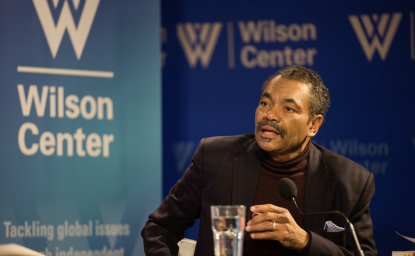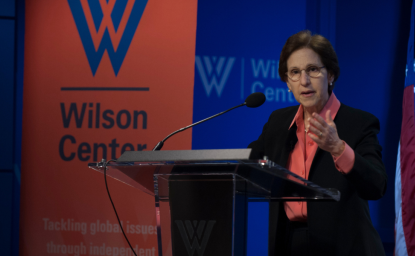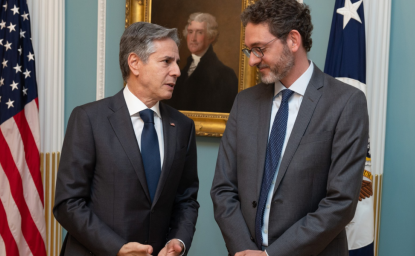
A blog of the Wilson Center
Olufemi Vaughan’s journey—from Nigeria to the United States, from student to scholar—has been one of organic intellectual exchange, mentorship, and a commitment to understanding governance and development. His passion isn’t just academic, it’s personal.
"I cannot conceive of my career as an academic without the Wilson Center at the center of it," Vaughan reflects. His connection to the institution is not just professional—it’s foundational. From conducting research to serving on selection panels for fellowships, he describes the Wilson Center as an intellectual home that mirrors the spaces he values so much.
"It was a very happy surprise." For him, it was a place where organic, spontaneous interactions shape meaningful discourse. "That's what makes the Wilson Center so special," he says. "It is not a top-down organization, but instead, creates a cherished space for people to do their work,” he says. "It's a place where you have so many people from different parts of the world. People who, quite frankly, would not ordinarily interact with each other as colleagues in major American universities. But at the Wilson Center, you’ll find them as colleagues, as friends, as people having lunch together. That’s invaluable."
Growing up in Ibadan, Nigeria, Vaughan was equally surrounded by lively debates and informal discussions. He was formed by an environment where the local and the global, the national and the transnational, and the diasporic were always in conversation.
"Ibadan was a place where people came from so many different places to really define who they are,."he says of the city’s immigrant roots and long tradition of writing and self-reflection. His parents and grandparents were deeply rooted in the culture of Ibadan, and the city itself was a hub of intellectual, cultural, and artistic ferment. "As a kid growing up in the 1970s, that was also a relatively stable period in Nigeria. We believed we could do anything as young people," he says. "We were raised to know we were the best and the brightest." That environment, he explains, gave him and his generation confidence to engage with the world, regardless of their socio-economic background.
His interest in governance and the Nigerian diaspora began early on. "The Nigerian diaspora is expansive, highly imaginative, and deeply connected to the homeland," he says. "We often discuss governance and development, but the real opportunity lies in using the expertise and creativity of Nigerians abroad."
Vaughan has not just studied these ideas, he has engaged with Nigerian policymakers, advocating for structured policies that use the skills and resources of the diaspora. For Vaughan, governance is not just about economics or policy—it’s about people. "When we think about governance and policy, we don’t think enough about the role of human capital," he says. "But the energy of Nigeria is actually in its young people. And you need to have a well-conceived policy that acknowledges that."
The importance of dialogue and exchange is something Vaughan defends in every space he is in. He believes intellectual work should not be isolated within the academic environment but should be part of everyday discourse. Whether it's through policy discussions, in the classroom, or with informal conversations, he tries to cultivate environments where knowledge is produced through interaction and reflection. "You engage. You exchange ideas. You argue. You reflect. And then something truly meaningful emerges."
His time at the Wilson Center has allowed him to immerse himself in these types of interactions, shaping his work in lasting ways. Beyond research and policy discussions, Vaughan has found lifelong collaborators and friends, reinforcing his belief that intellectual growth happens in community. He sees institutions like the Wilson Center as vital not just for scholarship but for fostering networks of trust and cooperation that have real impacts on governance and society.
At his core, Vaughan is a bridge-builder—between continents, between generations, and between ideas. As a professor of Black Studies at Amherst College, he shapes the field of African political and social history, diaspora studies, and governance. His book Religion and the Making of Nigeria is considered a key text on the relationship between faith and state in Nigeria and won the Nigerian Studies Association Book Prize in 2017; and he has advised Nigerian policymakers on how to better engage the country’s diaspora, pointing to India as an example of a successful model.
But his work is not just about governance or academia; it is about connection. Through his scholarship and policy work, he brings people together by fostering dialogue between policymakers and academics and shaping discussions on governance and the African diaspora in meaningful ways. His passion for knowledge, dialogue, and community remains the driving force behind his career, ensuring that his impact will be felt far beyond the walls of any institution.
Author


Africa Program
The Africa Program works to address the most critical issues facing Africa and US-Africa relations, build mutually beneficial US-Africa relations, and enhance knowledge and understanding about Africa in the United States. The Program achieves its mission through in-depth research and analyses, public discussion, working groups, and briefings that bring together policymakers, practitioners, and subject matter experts to analyze and offer practical options for tackling key challenges in Africa and in US-Africa relations. Read more

Explore More in Scholar & Alumni Spotlight
Browse Scholar & Alumni Spotlight
Dr. Maurice Jackson: The Sounds of Resistance Throughout History



